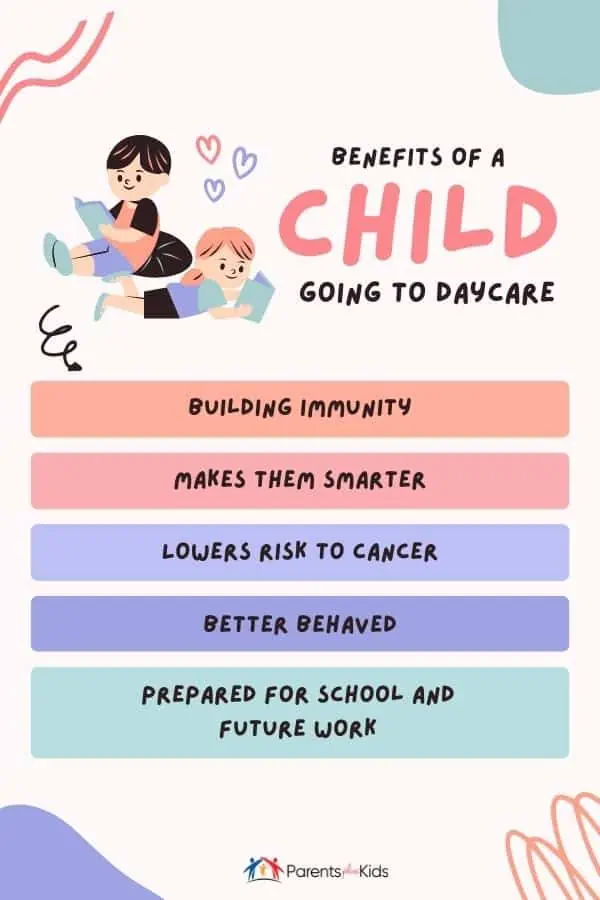5 Top Benefits & Statistics of a Child Going to Daycare

This post may contain affiliate links. If you buy through the link, I may earn a commission. Learn More.
More than 60% of children, ages 1-5, are in regular non-parental childcare.
With two working parents and the fast-paced frenzy, it’s simply a fact of life in America.
The good news is that there are real and long-term benefits associated with childcare placement.
Benefits of a Child Going to Daycare

Here’s a quick rundown.
- Kids who attend daycare build up an immunity to germs.
- Kids who attend daycare may be smarter.
- Kids who attend daycare may have a lower risk of cancer.
- Kids who attend daycare may be better behaved.
- Kids who attend daycare may be better prepared for school and future work.
1. Kids who go to daycare build up an immunity to germs.

A recent pediatric study found that children benefited from being exposed to germs in a daycare center.
It gives the kids a chance to build up an immunity to infections and common childhood ailments in a safe and nurturing environment.
That natural immunity benefits children as they enter school and other social situations.
Bottom Line:
While you can’t protect your child from every germ or illness, you can give them the chance to build up their immunity.
It may be compared to giving your child a set of invisible armor against the world of germs.
By preparing your child for germs, you’re also helping him or her to mitigate recurring issues that could pop up later.
2. Kids who go to daycare may be smarter (and perform better).

A new study indicates that a quality daycare center could be helping you to mold a budding Einstein.
A high-quality daycare situation supports language acquisition and cognitive development, which makes a big difference in school.
With a firm grasp of the basics, children perform better on standardized tests and are better communicators.
Bottom Line:
A quality daycare center allows you to better prepare your child for the world of learning and school.
You child should develop better communication skills and understanding in a stimulating environment.
A background in a daycare setting may just give your child the skills and emotional intelligence they need to succeed.
3. Kids who go to daycare may have a lower risk of cancer

None of us wants to think about the possibility of childhood cancer, but it happens (whether we like it or not).
The good news is that exposure to germs at a quality daycare center does more than just build up your child’s immunity.
Studies indicate that children in daycare are at a lower risk of developing leukemia or other cancers, by as much as 30%.
Bottom Line:
Scientists theorize that a daycare setting may help prevent the immune system from overreacting to germs.
There’s no way to know what health challenges your child may face in the future, but it looks like daycare might help.
A daycare setting may protect and prepare your child in more ways than you can imagine (or want to think about).
4. Kids who go to daycare may be better behaved (and emotionally balanced).

A recent study indicates that children in a quality daycare setting are more likely to be more socially adept.
It makes sense that your child is learning positive social skills and peer-related patterns of behavior in a quality daycare.
Those skills are the building blocks for your child to develop healthy relationships and emotional balance.
Bottom Line:
Early exposure to socially acceptable behavior in the group setting prepares your child for school and life.
A daycare setting can help your child develop the skills and knowledge they need to be healthy and happy.
That emotional balance will help with coping skills as your child faces challenges in school and life.
5. Kids who go to daycare are prepared for school, college, and future work.

A quality daycare setting prepares your child for school with the development of math and reading skills.
Early skills acquisition is critical to success in school, and it also leads to a higher chance that he/she will go to college.
Studies indicate that the skills and knowledge learned early on can also contribute to a 75% chance of full-time employment long-term.
Bottom Line:
A quality daycare setting could be likened to practice for the game of life.
It may be more important to your child’s future success than you could possibly imagine.
Your child is still doing all the work, but a daycare setting early on may just be giving him/her the tools for success.
Final Thoughts
What Do you Need to Consider, Really?
You want the very best for your child because you love them. That’s why you work hard to give your child the best chance for a happy, healthy future.
The good news is the benefits of sending your child to daycare are clear.
You may still worry, but you should know that you’re making the best decision for your family.
Please comment below to let us know if you’ve chosen daycare. Join the discussion.
